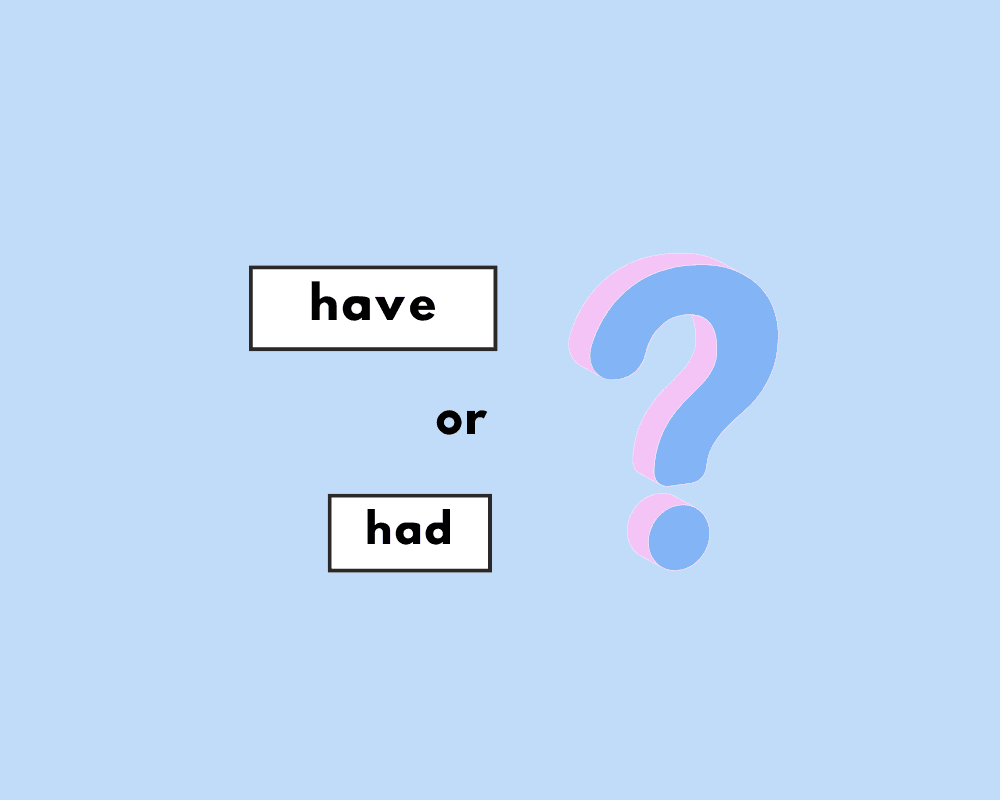When should you use “have” or “had”?
When is it correct to use have, has, or had? Phrased differently, what’s the past tense of have? Let’s go ahead and have a look at the answers.
What does “have” mean?
To define the word, when you have something, you “own, hold, or possess it.” For example, in a sentence, we might say, “He had bought a new car and a boat.”
When to use have, has, and had
| subject | simple present | simple past | present perfect | present continuous |
|---|---|---|---|---|
| i | have | had | have had | am having |
| you | have | had | have had | are having |
| we | have | had | have had | are having |
| they | have | had | have had | are having |
| he | has | had | has had | is having |
| she | has | had | has had | is having |
| it | has | had | has had | is having |
Compare the role of ‘have’ and 'had' in the sentences:
I have a dentist appointment later today.
I had a dentist appointment, but I cancelled last minute.
The first sentence is in the simple present tense, first-person singular. The second sentence uses 'had' in the simple past (also first-person singular).
‘Has’ applies to all third-person subjects in the present tense, (he, she, it), and ‘have’ is in the first and second-person. Had is the past tense and past participle form for all subjects.
| Base verb | Past tense | Past participle |
|---|---|---|
| have or has | had | had |
| do or does | did | done |
| go | went | gone |
| lead | led | led |
When to use has and had
Compare the role of ‘has’ and ‘had’ in the following sentences:
She has a dentist appointment later today.
She had a dentist appointment, but she cancelled last minute.
The first sentence is the simple present tense (third-person singular). The second sentence uses 'had' in the simple past tense.
‘Has’ is for third-person singular subjects in the present tense. Had is the past tense and past participle form for all subjects.
| Base verb | Past tense | Past participle |
|---|---|---|
| has (third-person singular present) | had | had |
Have/had as auxiliary verbs
To have is one of English’s three auxiliary verbs (along with to be and to do). This means that apart from playing a main role in sentences, have also often plays a supporting role in forming aspects of tense, such as perfect and progressive verb tenses.
This had been done before.
We have eaten here many times before.
We are having a great time!
When ‘have’ is in sentences with another verb, that's the telltale sign it's functioning as an auxiliary, and not the main verb.
“Have” / “has” / “had”, in sentence examples
| Verb form | Example Sentences: have, has, had |
|---|---|
| Have (or having) |
I have something to tell you. We're having my parents over for dinner. |
| has (third-person present singular) |
He has a long way to go until he gets his doctorate. She has visited many coastal towns, but Rockport's her favourite. |
| had (past tense) |
I had heard the phone but didn't reach it in time to answer. He had told me he left town, but I'd forgotten. |
“Haven't” / “hasn't” / “hadn't”, in sentence examples
| Contraction | Example Sentences: haven't, hasn't, hadn't |
|---|---|
| haven't (have not) |
I haven't seen that movie yet. You haven't finished your vegetables. |
| hasn't (has not) |
She hasn't arrived at the party. He hasn't called me all day. |
| hadn't (had not) |
We hadn't expected so much traffic. They hadn't realized the time until I pointed it out. |
Origin of have
Old English habban “to own, possess; be subject to, experience,” from Proto-Germanic *habejanan.
Fill-in-the-blank: “Have” conjugations
My sister _____ a new puppy.
We _____ dinner early last night.
They _____ gone to the store.
She _____ finished her homework before dinner.
Which sentence uses ‘have’ or ‘has’ correctly for present possession, based on the examples in the post?
I a new bicycle.
We a wonderful time on our vacation last year.
She written three books so far.
By the time I arrived, they already eaten dinner.
He a lot of homework yesterday.
FAQs
When do you use have vs had?
+
When is ‘has’ used instead of ‘have’?
+
Is ‘had’ used for all subjects in the past?
+
How is ‘had’ used as an auxiliary verb?
+
Can I use ‘have went’ or ‘had wrote’?
+
Yash, D. "How to Use Have or Had? (Explained, with Examples)." Grammarflex, Sep 24, 2025, https://grammarflex.com/have-or-had/.








